
Issue 28 - March 2024
Fossil Fuel
Exit Plan
Why we need a non-proliferation treaty
Also in this issue
The scramble for African energy Women in Revolt! Colombia speaks out
Challenging the power of the


Issue 28 - March 2024
Fossil Fuel
Exit Plan
Why we need a non-proliferation treaty
Also in this issue
The scramble for African energy Women in Revolt! Colombia speaks out
Challenging the power of the
World leaders, activists, and an ever-growing delegation of fossil fuel lobbyists descended on Dubai in December for the UN’s COP28 climate summit – and Global Justice Now was among them. Issues that loomed large included funding for the climate loss and damage experienced by countries in the global south, and the possibility of agreement on a fossil fuel phase-out.
The summit started with a step forward, as countries reached a deal for managing the loss and damage fund they had agreed to establish at COP27. This was a historic moment, and a much-needed win for the climate justice movement. Part of the deal, however, is that the World Bank –which has a history of funding fossil fuel projects, is run by rich countries and largely gives loans rather than grants –will run the fund for the next four years.
Loans for loss and damage would be unjust and counterproductive, leaving global south countries more heavily indebted rather than compensated for climate impacts.
The funds pledged to the new fund also didn't come anywhere close to the hundreds of billions that are needed annually. The US’s pledge of $17.5 million was laughable, and the UK’s £60 million – all from previously announced budgets – not much better. In total, just $700 million was pledged at COP28, less than 0.2% of the estimated economic losses the global south is facing every year.
Hopes were raised that COP28 might be the moment the world finally agreed on a fossil fuel phaseout – the long-overdue step that should be the basic starting point of climate negotiations. But once again this failed to materialise. While
countries did agree to unprecedented language on transitioning away from fossil fuels, the text contained gaping loopholes and dangerous distractions – like the use of carbon capture – that betrayed the influence of the record numbers of fossil fuel lobbyists present. The mention of a transition from fossil fuels does, however, provide a slight opening for campaigning this year. Another step forward at COP28 was the Colombian president’s announcement of support for a Fossil Fuel Non-Proliferation Treaty (see page 18). This kind of global fossil fuel exit plan is urgently needed to complement the UN climate process, working with different rules that would make it much quicker and more effective than the COP process has become (see page 8).
2023 saw Global Justice Now and allies take the Energy Charter Treaty (ECT) from a little-known secret weapon of fossil fuel companies ignored by politicians, to a poisoned chalice countries are fleeing from – forcing the UK government to announce a review of its membership in September.
Ministers committed to consider exiting the deal if ‘modernisation’ proposals weren’t agreed by November. Sure enough, at November’s meeting the proposals
were again taken off the table – and by then we’d delivered over 120,000 signatures to Downing Street calling on the UK to quit this obsolete and dangerous deal.
But since then it’s been radio silence from the government, despite their acknowledgement that there is “no clear route to modernisation”. More worryingly, the November meeting discussed plans to expand the treaty’s membership to major oil-producing countries, shattering the myth of a modernised treaty fit for protecting
the green investments of the future.
As a result, Global Justice Now supporters are putting renewed pressure on ministers to carry out the review and draw the obvious conclusion of quitting the treaty. For every day they fail to do so, ministers are locking the UK into the risk of foreign companies adding billions to the cost of the fossil fuel phase-out.
Take action at: globaljustice.org.uk/ect
Below: Handing in the petition in November


Efforts to constrain Big Pharma's ability to profiteer in future health crises are being held back by rich nations, including the UK, as talks over a global pandemic treaty head towards a deadline in May.
After disastrously unequal access to Covid-19 vaccines caused over a million preventable deaths, countries in the global south are aiming to secure agreement that medicines technology will be transferred in the event of another pandemic, as well as reassurances that Big Pharma patents won't get in the way of fair access to vaccines and treatments. Despite all of the major Covid-19 vaccines receiving substantial public funding, pharmaceutical companies were allowed to privatise them with few conditions. As part of the People’s Vaccine Alliance, Global Justice Now is supporting this effort, including calls for strict public interest conditions to be applied to future research, guaranteeing wide access and affordability.
However, reports suggest that the UK, the EU and the US are resisting such measures, with negotiators dragging their feet ahead of the World Health Assembly in May, when agreement is expected to be sought on the treaty. Campaigners have argued that resistance to demands from the global south is hypocritical, with the EU recently developing new proposals to override patents to help it respond to health crises. The US administration is also facing accusations of double standards, having supported American companies to bypass patent rights for components of Covid-19 vaccines. Together with partners, we’re lobbying the government to get behind a deal that constrains the worst excesses of corporate power and pushing the UK government to back a treaty that puts global health before the interests of the pharmaceutical industry.
Over the last year, Global Justice Now has explored across our campaigns how a small pool of corporate giants is dominating the economy that governs our basic needs – from medicine and food to energy and technology. On Black Friday in November, a broad movement of organisations and trade unions mobilised across the UK in response to one of the main villains in this story of monopoly capitalism: Amazon.
Global Justice Now led in pulling together a demonstration outside Amazon’s London HQ with allies for Make Amazon Pay day, coinciding with workers at Amazon’s Coventry warehouse walking out on strike, and actions in 30 countries around the world. Joining the call for Amazon to pay fair wages, to pay its taxes and to pay for its impact on the planet, we added our perspective on Amazon’s monopoly power built via manipulating economic rules.
Besides lobbying to influence trade deals in their favour – to lock in deregulation and prevent data being protected in local jurisdictions – Amazon is among the Big Tech giants buying up the platforms and data needed, from farm to grocery, to profit from the entire the food system.
Read our Amazon briefing at:
globaljustice.org.uk/ make-amazon-pay
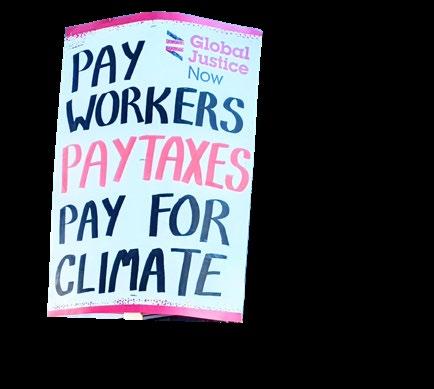
Take action at: globaljustice.org.uk/pandemic-treaty
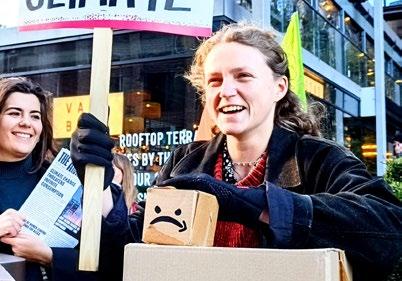

South Africa presents its case to the International Court of Justice in January.
The International Court of Justice called on Israel to take all possible actions to prevent genocide in Gaza in January, in a preliminary ruling following a case brought by the government of South Africa. A full investigation will now take place which could last several years, after Israel’s demand for the case to be dismissed was rejected.
Israel has killed more than 25,000 civilians, wounded at least 60,000 more, and forced over 1.9 million people from their homes during its months-long assault on Gaza, which followed attacks by Hamas in October when hundreds of Israeli civilians were killed. “The articulated intent is the destruction of Palestinian life,” South Africa’s lawyers told the court.
Global Justice Now has backed calls on the UK government to push for an immediate ceasefire in Gaza, as well as an embargo on UK arms sales to Israel. The situation has brought renewed international attention to the need to address the root cause of the conflict: Israel’s decades-long illegal occupation of Palestinian land.
Honduras’s progressive president Xiomara Castro answered mass mobilisations last year by repealing a law allowing ‘special economic zones’ – deregulated business districts first introduced after a US-backed coup in the country. But now a mammoth corporate court claim – using investorstate dispute settlement (ISDS) clauses in a trade agreement with the US – is
being weaponised to overturn this movement win.
In these unregulated zones, companies are free to set their own laws, flout workers’ rights and siphon off wealth into tax havens. US company Próspera – brainchild of a group of extreme libertarians – had set about creating a free market utopia on the Honduran island of
Roatan. Now thwarted, Próspera is suing Honduras for an outrageous sum of almost $11 billion – two-thirds of the government’s 2023 budget. But Honduras is fighting back against this corporate colonialism, threatening to quit the World Bank’s ISDS institution, and adding its voice to the growing chorus against the wider ISDS regime.
Argentinians
Milei’s ‘shock therapy’
Workers across Argentina joined a general strike in January in opposition to new far-right libertarian president Javier Milei’s assault on the state, which former Ukip leader Nigel Farage has called “Thatcherism on steroids”. Milei’s self-described “shock therapy” includes mass privatisation and massive spending cuts, as well as rolling back workers’ rights and the right to protest.
The gap between rich and poor has become “supercharged” since the Covid-19 pandemic, Oxfam found, in a report released as the World Economic Forum in Davos took place in January. The top five billionaires have doubled their wealth, while almost five billion people have become poorer, with the first trillionaire expected within a decade.
New progressive president Bernardo Arevalo was sworn in in Guatemala in January after widespread mobilisations, including by Indigenous groups, to ensure the peaceful transfer of power. Arevalo, who has pledged to tackle corruption, won elections in August by a landslide but had been faced with multiple legal challenges by AttorneyGeneral Consuelo Porras.
Countries at the UN agreed to begin the process of transforming how global tax rules are decided in November, when they voted by an overwhelming majority to establish a framework convention on tax. It could eventually move decisionmaking on the rules from the OECD – a small club of rich countries that has presided over global tax policy for more than 60 years – to the UN.
“This is a historic victory delivered by countries of the global south, for the benefit of people all around the world,“
said Alex Cobham of the Tax Justice Network. “Tax havens and corporate lobbyists have had too much influence on global tax policy at the OECD for too long.“
The vote followed weeks of opposition from OECD members, including a lastminute attempt by the UK to remove any mention of a convention. The result demonstrates the overwhelming demand from the global south for the meaningful voice on international tax rules which they have historically been denied.

Indigenous communities in Argentina’s northern province of Jujuy have continued to protest against the imposition of lithium mining in the region, despite violent repression and constitutional changes limiting land and protest rights pushed through last summer. Amnesty International has documented the use of indiscriminate force, rubber bullets and enduring intimidation and surveillance.
Lithium, known as ‘white gold’, is crucial for smartphones, laptops and as a key component of electric car batteries. As nations vie for security over
critical minerals for the green transition, the ancestral lands of Indigenous communities in Argentina are becoming sacrifice zones threatened by land grabs, water shortage and environmental damage.
Argentina has the world’s secondbiggest lithium deposits, with 38 mining projects planned and new far-right leader Javier Milei promising to grow the industry further. "The government doesn’t care because they are in the business of making money,” Silvana Yanez, a lawyer for the protesters, told the Guardian

After three decades of UN climate talks, countries still can’t reach consensus on phasing out the cause of the problem. It’s time for a new approach, writes IZZIE McINTOSH.
It wasn’t formally on the agenda of COP28, the UN’s climate talks in December, but a proposal was discussed that was both popular and powerful – and could change the course of the climate fight: a Fossil Fuel Non-Proliferation Treaty.
World leaders have failed us in many ways when it comes to the climate crisis. But one of their most egregious missteps has been their feeble approach to targeting planet-wrecking coal, oil and gas. The Paris Agreement, which is the current basis of the UN climate process, doesn’t mention fossil fuels once. UN climate conferences have taken nearly 30 years to name and shame the major cause of the problem – finally doing so last year in Dubai. But even the agreement politicians made at COP28 is full of dangerous distractions and loopholes. Considering that fossil fuels account for over 75% of global greenhouse gas emissions and nearly 90% of all carbon dioxide emissions, this is madness.
Politicians the world over have let themselves be taken in by the fossil fuel industry’s multimillion pound lobbying machine – there were almost 2,500 fossil fuel lobbyists at COP28. They’ve focused almost entirely on reducing demand for fossil fuels, while doing precious little to get the industry to stop extracting new coal, oil and gas from the ground. At a time when we should be phasing out our use of fossil fuels as rapidly as possible, the industry plans to continue to expand.
its own climate-wrecking activities. Corporate giants like Shell and BP will keep pumping out oil, making billions from encouraging us all to use it, until governments step in and change the rules of the game. Given the scale of the challenge ahead, we know we need international cooperation to end the fossil fuel era. But our current systems are failing us. We need a new approach that complements the UN process, is set up to work much more quickly, and tackles fossil fuels directly – to manage the transition, rather than leaving it to chance.
The Fossil Fuel Treaty initiative is a global campaign supported by national governments, major cities, scientists and youth leaders worldwide. It would commit governments to three pillars of action: no new fossil fuels, phasing out existing stockpiles fairly, and a globally just transition from fossil fuels.
 © Justin Lane/EPA-EFE/Shutterstock
© Justin Lane/EPA-EFE/Shutterstock
The campaign has been spearheaded by Pacific Island states – including Fiji, Vanuatu and Tuvalu – that are highly vulnerable to climate change. It’s a serious proposal that could make a real impact on the climate crisis. In countries like the UK – where huge wealth is propped up by oily money – we need to be building as much popular demand as possible for the treaty. It’s time to show politicians this is an idea they can’t afford to ignore.
That’s why we need a global exit plan that tackles fossil fuels at the point of production, dismantling the oil giants’ polluting business models, and planning an orderly and fair transition to cleaner sources of fuel. Reducing individual consumption is vital, but big oil has used this necessity as a tactic to distract from
No text has been written yet; currently, governments are being asked to endorse the need for a treaty, and to commit to coming to the negotiating table as the campaign progresses. Already, we’re seeing concrete progress. A number of national leaders agree that a treaty is needed. At COP28, endorsements

Below: Supporters at a protest in June. The Fossil Fuel Treaty aims to emulate similar treaties which have successfully reduced the supply of nuclear weapons and landmines.
© Fossil Fuel NonProliferation Treaty Initiative
from national governments grew, with Colombia taking the major step of becoming the first oilproducing country to formally endorse the treaty (see page 18). The State of California, another oil producer, also supports the proposal, and has the power to turn its commitment into an actual reduction in oil production.
The treaty is already gaining momentum in the UK too, with London, Edinburgh, Birmingham, Brighton, and the Green Party all endorsing it so far. Of course, we know that the current UK government isn’t falling all over itself to end fossil fuels. That’s why there are two immediate focuses for the campaign in the UK: seeking initial political endorsements from both local and devolved governments, and building a groundswell of popular demand for a global exit plan from fossil fuels.
A powerful global coalition for a Fossil Fuel Treaty has the power to shift foreign policy

norms. If there are enough signatories around the world, and the people are demanding a global exit plan in the UK, we can force whoever is in government to act and avoid being left behind with business as usual.
We’ll be working with activists to demand endorsements from local MPs, mayors, councils, and more. We’ll also be collaborating with key partners to influence MPs in Westminster, so they are hearing about the treaty from every angle. We know that our network has power, and that we can work together to create grassroots pressure from below on national government. Ultimately, we can make the Fossil Fuel Treaty an idea they cannot ignore.
Sign the petition to party leaders at: globaljustice.org.uk/fft


Below: Climate justice movements from across Africa came together in protest at the first Africa Climate Summit, held in Nairobi, Kenya in September.
© Brian Inganga/ Associated Press/ Alamy Stock Photo
Right: Burning off gas from oil production in the Niger Delta, southern Nigeria.
© Friedrich Stark/ Alamy Stock Photo
investments have been destined for Africa. Continuing this perilous economic situation, over 70% of Africa’s oil and gas production is at risk of becoming stranded assets.
Nevertheless, we know that the kind of doomsday fossil fuel scenario that we currently see on the African continent is not inevitable. We can actually create a massive shift and work towards distributed renewable energy for all. But to get there, we need international cooperation and that's why a proposal like the Fossil Fuel Treaty is really essential. What we're pushing for is a shift that is already happening in some parts of the world – the end of the era of fossil fuels is coming. We saw in 2022 that it was the first year where growth in global electricity demand was met entirely by renewable energy. Alongside this we’re seeing a global decline in fossil fuel demand. Renewable

energy prices have been continuously falling, and the sector has been creating far more jobs than fossil fuels, helping to boost economies and increase energy access that can drive healthcare and education, and positive development outcomes.
But this shift will not happen fully, or rapidly enough, on its own. Africa is in fact home to the highest renewable energy potential on Earth – it has an almost 40% share of global renewables potential, including around 60% of solar. Yet despite this, most of Africa’s renewable energy potential is untapped. International cooperation is needed to change this and to ensure that the transition is grounded in equity and justice.

That’s where the Fossil Fuel Treaty comes in. The Paris Agreement which now drives the UN climate talks makes no mention of coal, oil and gas. We need a Fossil Fuel Treaty to provide a complementary mechanism that addresses
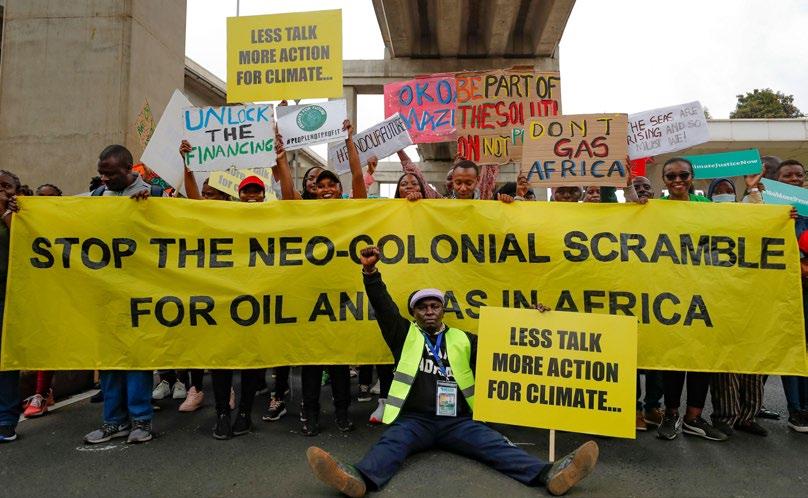

the root cause of the climate crisis, the main driver of almost 90% of carbon emissions in the past decade: fossil fuels.
Importantly, the treaty also aims to ensure that the transition away from fossil fuels is fair and just. There needs to be finance and technology transfer from the global north to the global south. Debt cancellation, economic diversification and alternative development pathways must be embedded into the transition.
What’s more, there must be an equitable governance framework to ensure that the richest fossil fuel producers – like the UK, Norway, Canada, the US and Australia –phase out their production first and fastest. They must give technical and financial support to countries that are currently quite dependent on fossil fuels for their economies – countries
like Angola, Iraq and Ecuador, whose economies are enmeshed with oil or gas or coal today.
The Fossil Fuel Treaty can really help expedite this transition in a way that’s putting global justice and equity at the centre, by grounding its reason for being in international cooperation, ensuring that there is equity in who phases out first, and giving financial support to those who are most dependent and have not driven this crisis. We can see the benefits of boosting economies and alternative pathways that are not economic monopolies on fossil fuels, but instead diversified economies that look to a distributed renewable energy model.
Africa is home to the highest renewable energy potential on Earth.
We are building our campaign for a Fossil Fuel Treaty by targeting cities and sub-national governments. Cities are the home of the majority of humanity, and they're also the largest energy consumers and the biggest carbon emitters on Earth. Cities are on the frontline of the climate crisis, they’re facing heatwaves and flooding and wildfires and disruptions to their everyday life.

Mayors and councillors are adapting and taking bold moves to protect their communities – to end fossil fuel financing, to end fossil fuel extraction if that happens in their jurisdictions, to remove the social licence of the coal, oil and gas industry, to retrofit buildings, and electrify their transportation. Supporting a Fossil Fuel Treaty is part of that effort.
We’ve now reached an amazing landmark, which we celebrated at COP28, of 100 cities and sub-national governments calling for a Fossil Fuel Treaty, which was a really exciting milestone. We have cities from London to Kolkata, from Vancouver to Belém, from Lima to Paris, and from Sydney to the state of California, that are backing the call and putting pressure on their national governments to do the same, to build momentum for the public campaign and also to phase out fossil fuels from their cities.
This groundswell of support will ultimately put pressure on governments to form a growing bloc of countries that can make the Fossil Fuel Treaty a reality, and bring the just transition to a renewable-powered future that our continent and the world urgently need.
Seble Samuel is head of Africa campaigns and advocacy at the Fossil Fuel Treaty Initiative. This is an edited version of her talk to our webinar in January: globaljustice.org.uk/fft-webinar.
Last year saw Global Justice Now local groups and supporters as active as ever campaigning around the country for a better world. Why not get active in your local area in 2024? Find your local group via globaljustice.org.uk/groups or email activism@globaljustice.org.uk for ideas and support.
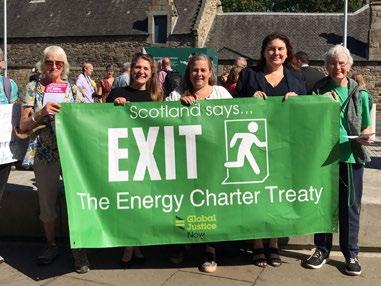




Every three years, Global Justice Now members elect 12 people to serve as our council. While staff run the organisation day-to-day and our Annual General Meeting is the ultimate decision-making body, our council is responsible for governing the organisation on behalf of members. That means overseeing our strategy, finances and general organisational priorities.

Nominations are now open for this year’s election, and close on 2 April. If you’re a member, full info is included with Ninety-Nine. and is also at globaljustice.org.uk/elections-2024.
Global Justice Now depends on ordinary members with different backgrounds and experience taking on this role, so if you’re interested, feel free to get in touch with steven.thomson@globaljustice.org.uk
Edinburgh Nottingham Reading Cambridge Glossop Stirling
As the US faces up to a possible new Trump presidency, DOROTHY GUERRERO considers a project of solidarity economics and Black liberation in Jackson, Mississippi
It is rare and very inspiring to see a movement that is practicing radical politics and undertaking a thriving alternative solidarity economics on a city-level scale, which is challenging the current economic system. More so when it is in a country at the very heart of capitalism itself, the United States of America. That is why it was a privilege to visit Cooperation Jackson when it hosted an international meeting of activists and academics in September.
Cooperation Jackson is probably the most radical political cooperative project in the world today. It is setting up a Blackled, solidarity-based new municipalism in Jackson, Mississippi, one of the poorest metropolitan cities in the poorest state in the US. Its roots, values and vision are deeply connected with the struggle for democratic rights and dignity, economic justice and self-determination, particularly for Black communities in the Deep South, and racialised workers in the US. At the same time, it has a very internationalist perspective of solidarity and unity with all struggles for self-determination, workers rights, climate justice and just transition.
Jackson is the capital of Mississippi, with a population that is 82% Black or African American, while 15% are white. The BlackWhite homeownership gap is wider today (30%) than in 1968 when the Fair Housing Act – which prohibited discrimination when selling, renting, or financing a home –was initially passed. The city is suffering from impoverishment and struggling to overcome decades of economic divestment, deindustrialisation, and suburban flight fostered by
structural racism and major shifts in the US and global economy.
These economic and demographic shifts have left chronic unemployment and underemployment, poorly performing schools, and an antiquated and decaying infrastructure. In 2022, Jackson hit the headlines when more than 180,000 people, along with hospitals, fire stations and schools, were left without safe drinking water when the largest water treatment plant in the city failed. At the time of writing, Jackson’s water is still unsafe to drink, something hard to believe in the richest country in the world.
Generations of social movements in the US have seen the eastern Black Belt portions of Mississippi as vehicles of Black selfdetermination, empowerment and emancipatory politics for oppressed peoples and exploited classes.


Below: Kali Akuno, co-founder and executive director of Cooperation Jackson.
Right (top): Visiting the Center for Community Production; (bottom) the education and training centre. © Dorothy Guerrero/Global Justice Now.

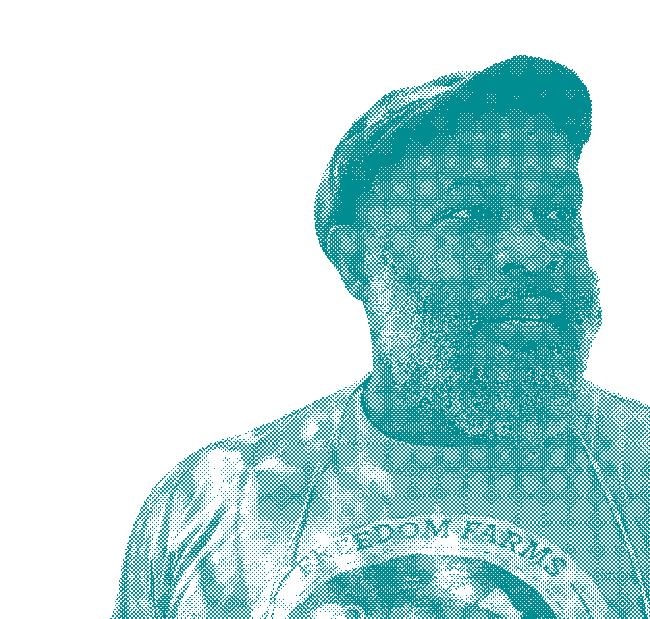


Historically, enslaved Black people in plantations organised rebellions in Mississippi and Louisiana. Throughout the 1950s and 1960s, Jackson was at the centre of the US civil rights movement. It was the home of activists like Medgar Evers, the first field secretary of the National Association for the Advancement of Colored People (NAACP) and Fanny Lou Hammer, voting and women’s rights activist, community organiser, and a leader in the civil rights movement.
Jackson was also the site of some of the most nationally significant protests of the period, and where the politics of leading figures like Ella Baker, Martin Luther King and Malcolm X were crystallised during the fight for equality in the United States.
Cooperation Jackson was founded by activists from various states in the US who consciously chose to move to Jackson to live and organise there. For more than a decade it has been organising with the goal of attaining selfdetermination for people of African descent and the radical, democratic transformation of the state of Mississippi. It is an experiment in participatory and horizontal democracy.
Cooperation Jackson is an experiment in participatory and horizontal democracy.


At the heart of the project is the Fannie Lou Hamer Community Land



Trust, which owns over 30 properties on 20 acres of land in Jackson, and allows a network of worker cooperatives to operate free from the rental demands of external landlords. This emerging network currently includes a Freedom Farms coop, a Green Team Landscaping coop, a Waste Management coop, a Construction Worker/Skilled Labor coop, and several more. The Center for Community Production has a 3D printing shop that produced masks which were distributed for free to the communities at the height of the Covid pandemic. They recently acquired a former grocery that they are now fundraising for to develop as Ida Wells Plaza.
The cooperatives are connected to a wider process of social and political transformation through people’s assemblies, which guide Cooperation Jackson’s work – for example, setting the objective to make Jackson as autonomous and sovereign in food production as possible. The Kuwasi Balagoon Center for Economic Democracy and Development is the cooperative education and training centre which spreads the political understanding of their work. “It is these three components – the land trust, the co-ops, and the solidarity support institutions – that make up the core practice of what we do,” says cofounder Kali Akuno.
Ultimately, the aim is for Cooperation Jackson to be a catalyst for the democratisation of the economy and society overall. And with the US facing such an uncertain future, it is inspiring to see such an alternative in action.
Dorothy Guerrero is head of policy and advocacy at Global Justice Now.


4. Untitled, 1976 Linder
Purchased by Tate in 2007. © Linder


5. Solidarity With Sisters, 1981
6. Protest, 1974
See Red Women’s Workshop, 1974-1990
See Red Women’s Workshop
We are in a struggle between fossil capital and human life
At a side event at COP28 in December, Colombian president GUSTAVO PETRO announced his country’s support for a Fossil Fuel Non-Proliferation Treaty.
Today, it is increasingly evident that countries heavily dependent on fossil fuel production must embark on a challenging yet intelligent and rational transition towards a way of life without oil and coal.
It is paradoxical that here at this table, alongside individuals on the frontlines whose populations may vanish due to the climate crisis, there is a country like the one I represent. Because we also depend on oil and coal for our livelihood.
In my country, the simple fact that I am sitting at this table, requesting to sign a new global Fossil Fuel Non-Proliferation Treaty that implies zero new exploitation, is paradoxical. There, in my own society, they would say, “How could the president of our country contemplate such economic suicide, given our dependence on oil and coal?”

But this is not economic suicide. Being here means attempting to prevent a suicide. The precise term is 'omnicide' in Spanish. It means the death of all living things, the interconnected extinction of everything that exists – an omnicide. It's a homicide of the life force of the planet.
So, this is not economic suicide. What we are advocating for here is to prevent the homicide of Planet Earth. And for that, undoubtedly, there is no other way, no other path. The alternatives are mere illusions.
This is the sole means to safeguard something as exquisite as life and as profound as the intelligent embodiment of life within our species. It entails discontinuing the consumption of oil, coal, and gas.
It may seem easy, but it highlights the formidable economic interests surrounding oil,
coal, and gas. The most significant economic interests within capitalism that currently exist and actively resist change. They persist in a selfdestructive manner, prioritising the accumulation of further profits.
The owners of this capital are acting in a way that endangers life, driven by profit motives. Today, we are not simply facing the immense antagonistic class struggle that 19th-century socialists envisioned, but something more dire. We are confronted with a struggle between fossil capital and human life, including the life of our planet. And we must choose a side.
And any person, anywhere in the world, would understand that the only stance to take is in favour of life. Therefore, as the President of the Republic of Colombia, even though our nation still relies on oil and coal and we are striving to transition away from them, I have no doubt about the stance we must adopt.
Gustavo Petro is the president of Colombia. This extract from his speech at COP28 was translated for the Fossil Fuel NonProliferation Initiative, fossilfueltreaty.org